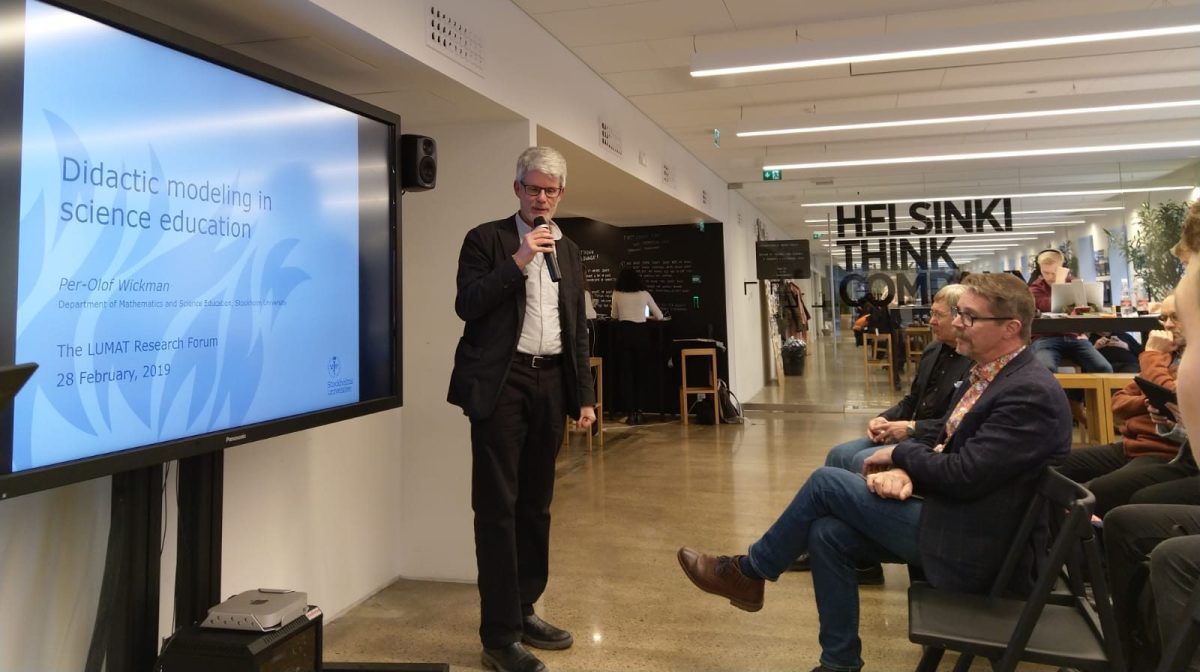LUMAT Science Research Forum organizes yearly three types of events, research seminars, research symposiums, and summer school, focusing primarily on the research of math, science, and technology education. Our events are open to scholars all over the world! Read more about these activities below.
LUMAT Research seminars
In LUMAT Research Seminars, researchers and students present their latest math, science, and technology education research and receive peer feedback. With Research Seminars, we aim to foster connections between science education researchers in different universities, regardless of your field of study. Other research-related topics, such as research methods, can be discussed according to participants’ needs and interests.
Upcoming seminars
There are no upcoming seminars at the moment.
Other events
LUMAT Research Symposium
The annual research symposium gathers researchers and doctoral students worldwide to present and discuss current math, science, and technology education research. In the symposium, we combine traditional research presentations and new and inspiring methods to collaborate and discuss research, such as debates.
The 14th LUMAT Research Symposium was held on the 3rd and 4th of June 2024. Read more about the Symposium on this website.
LUMAT Summer School
In the annual Summer school, we aim to build collaboration between researchers, doctoral students, and teachers, promote discussion on the quality of research, and bring people together to discuss math, science, and technology education. Summer school is primarily targeted at new scholars.
The Summer School 2023 was held on the 16th of June together with the LUMAT Research Symposium.
Previous research seminars
The year 2024
29.11.2024
The theme of the seminar was Current research trends. The chair of the seminar is Prof. Maija Aksela, University of Helsinki. The keynote will be given by Dr. Johannes Pernaa, Editor-in-Chief of LUMAT, University of Helsinki. A panel discussion will be hosted after the keynote. The panelists are LUMAT editors and authors.
6.3.2024
Docent, University Lecturer Johannes Pernaa, University of Helsinki: Generative chatbots and information seeking
B.Sc. Maikki Roiha, University of Helsinki: Immersive technologies in education: 360° live stream video in a virtual chemistry field trip
M.Sc. Aleksi Takala, University of Helsinki: Chemistry professionals’ views on cheminformatics potential: A qualitative study in chemistry education
The year 2023
15.11.2023
Perttu Ervelius, University of Helsinki. Learning of creative, critical and computational thinking through robotics and coding in primary classrooms in Helsinki and Johannesburg
Henri Hämäläinen, University of Helsinki. Coherence in science teacher education: integration between theory and practice
14.9.2023
Russell Tytler, Alfred Deakin Professor of Science Education at Deakin University & Peta J. White, associate professor in science and environmental education at Deakin University
Supporting multimodal learning in science: a semiotic perspective
Agency in the Anthropocene
16.3.2023
Sanni Suominen (UEF) Ammatillisen koulutuksen aloittavien opiskelijoiden näkemyksiä ja odotuksia matematiikan opetukseen liittyen
Juho Tiainen (UEF) Yläkoululaisten okemuksia matematiikan opiskelusta ja ammatteihin sekä työtehtäviin linkitetyistä matematiikan tehtävistä
Mikko Nykyri (LUT) Hyötypelien ja pelillistämisen käyttö sähkötekniikan opetuksessa
30.1.2023
Prof. Jorge Rodríguez-Becerra, Universidad Metropolitana de Ciencias de la Educación, Santiago, Chile: Computational Science in Chemistry Teachers Education: Opportunities and Lessons Learned
Prof. Lizethly Cáceres-Jensen, Universidad Metropolitana de Ciencias de la Educación, Santiago, Chile: Towards Climate Change Education Through authentics Problems in the Framework of EDS to Chemistry Teacher Education


